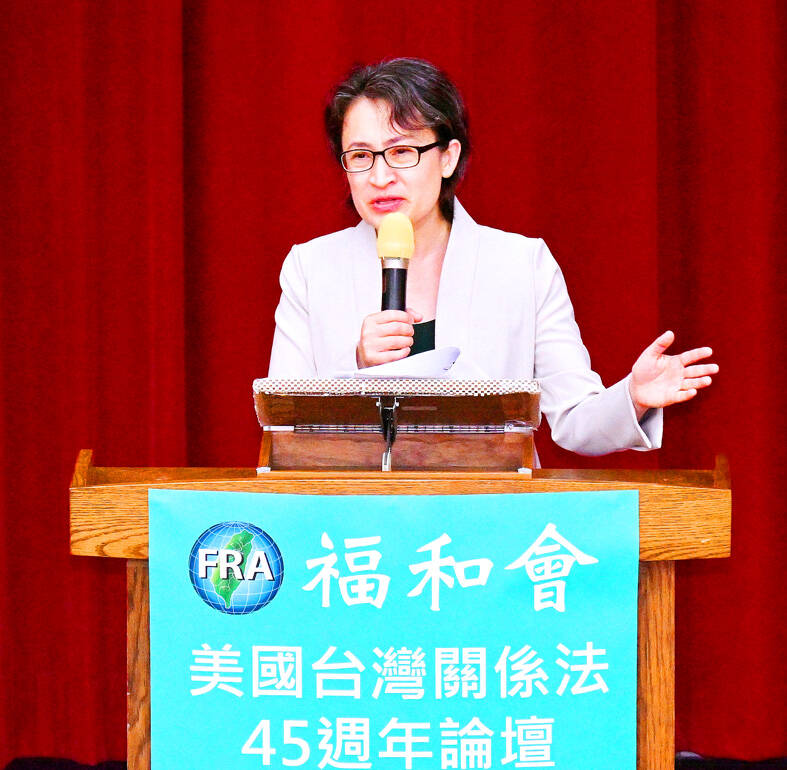Taiwanese need to demonstrate their resolve to defend freedom, democracy and the nation’s sovereignty, while increasing the defense budget and accelerating military reforms to garner more support internationally, vice president-elect Hsiao Bi-khim (蕭美琴) said yesterday.
Hsiao made the remarks in a speech at a forum in Taipei on the 45th anniversary of the US’ Taiwan Relations Act (TRA), which is a foundation for Washington’s policy toward Taipei in the absence of formal diplomatic ties.
Hsiao, who is to take office on May 20, reiterated president-elect William Lai’s (賴清德) commitment to his “four-pillar” plan to safeguard peace and stability in Taiwan, which underscores the importance of defense, economic security, partnerships with other democracies and a stable and consistent cross-strait policy.

Photo: Fang Pin-chao, Taipei Times
Under Lai’s leadership, Taiwan would continue to be a steady and responsible member of the Indo-Pacific region, she told the forum hosted by the Formosa Republican Association.
Over the past eight years, President Tsai Ing-wen’s (蔡英文) steady leadership has facilitated “a very smooth channel of communication” between Taiwan and the US and enabled a bilateral relationship built on “mutual trust” and “zero incidents,” Hsiao said.
Under Lai’s leadership, Taiwan would continue to be a “stable [and] responsible” member of the Indo-Pacific region and contribute to regional prosperity, Hsiao said, adding that this would be “key” to increasing goodwill between the two sides.
Relations between Taiwan and the US would continue to grow, despite both countries facing new global challenges, in particular Russia’s protracted war in Ukraine, the Israel-Hamas war and China’s destabilizing activities in the region, she said.
Hsiao said she anticipates more bilateral collaboration in the fields of education, technology and culture, and hopes the US Congress will expedite the legislative process to eliminate double taxation with Taiwan.
The TRA was passed by the US Congress after Washington switched diplomatic recognition from the Republic of China to the People’s Republic of China. It was signed into law by then-US president Jimmy Carter on April 10, 1979.
The act has served as a legal framework for Washington in guiding its unofficial relations with Taipei, including providing arms to meet its defensive needs.
Additional reporting by Chen Cheng-yu

LONG FLIGHT: The jets would be flown by US pilots, with Taiwanese copilots in the two-seat F-16D variant to help familiarize them with the aircraft, the source said The US is expected to fly 10 Lockheed Martin F-16C/D Block 70/72 jets to Taiwan over the coming months to fulfill a long-awaited order of 66 aircraft, a defense official said yesterday. Word that the first batch of the jets would be delivered soon was welcome news to Taiwan, which has become concerned about delays in the delivery of US arms amid rising military tensions with China. Speaking on condition of anonymity, the official said the initial tranche of the nation’s F-16s are rolling off assembly lines in the US and would be flown under their own power to Taiwan by way

OBJECTS AT SEA: Satellites with synthetic-aperture radar could aid in the detection of small Chinese boats attempting to illegally enter Taiwan, the space agency head said Taiwan aims to send the nation’s first low Earth orbit (LEO) satellite into space in 2027, while the first Formosat-8 and Formosat-9 spacecraft are to be launched in October and 2028 respectively, the National Science and Technology Council said yesterday. The council laid out its space development plan in a report reviewed by members of the legislature’s Education and Culture Committee. Six LEO satellites would be produced in the initial phase, with the first one, the B5G-1A, scheduled to be launched in 2027, the council said in the report. Regarding the second satellite, the B5G-1B, the government plans to work with private contractors

‘NARWHAL’: The indigenous submarine completed its harbor acceptance test recently and is now under heavy guard as it undergoes tests in open waters, a source said The Hai Kun (海鯤), the nation’s first indigenous defense submarine, yesterday began sea trials, sailing out of the Port of Kaohsiung, a military source said. Also known as the “Narwhal,” the vessel departed from CSBC Corp, Taiwan’s (台灣國際造船) shipyard at about 8am, where it had been docked. More than 10 technicians and military personnel were on deck, with several others standing atop the sail. After recently completing its harbor acceptance test, the vessel has started a series of sea-based trials, including tests of its propulsion and navigational systems, while partially surfaced, the source said. The Hai Kun underwent tests in the port from

MISSION: The Indo-Pacific region is ‘the priority theater,’ where the task of deterrence extends across the entire region, including Taiwan, the US Pacific Fleet commander said The US Navy’s “mission of deterrence” in the Indo-Pacific theater applies to Taiwan, Pacific Fleet Commander Admiral Stephen Koehler told the South China Sea Conference on Tuesday. The conference, organized by the Center for Strategic and International Studies (CSIS), is an international platform for senior officials and experts from countries with security interests in the region. “The Pacific Fleet’s mission is to deter aggression across the Western Pacific, together with our allies and partners, and to prevail in combat if necessary, Koehler said in the event’s keynote speech. “That mission of deterrence applies regionwide — including the South China Sea and Taiwan,” he